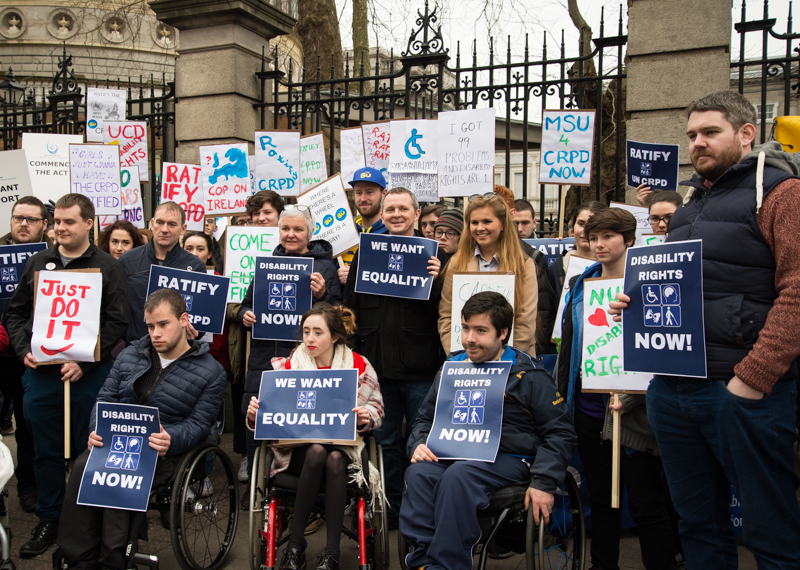A student-led protest calling on Ireland to ratify the UN Convention of Rights for People with Disabilities is taking place outside of Leinster House this afternoon with support of unions including Trinity College Dublin Students’ Union (TCDSU) and the Union of Students in Ireland (USI).
The protest, organised by Trinity student Niamh Herbert, aims to highlight how Ireland is the only EU member state that hasn’t ratified the convention, which requires countries to ensure that those living with disabilities are equal under the law.
The convention, which seeks to challenge attitudes and approaches towards people with disabilities and the view of people with disabilities as “objects” of charity or protection, has been ratified by 150 countries. Ireland signed the convention in 2007, but is yet to ratify it. There are currently over 600,000 people in Ireland living with a disability.
In an email to The University Times, Herbert stated that today’s protest was also intended to “raise awareness about the plight of those with disabilities here in our society – a lack of knowledge often contributes to the level of discrimination against those with disabilities”.
“To me, it would make a huge difference”, Herbert continued. “I’ve found it to be impossible to find wheelchair-accessible accommodation in Dublin, and I’ve been turned away from on-campus Trinity accommodation. Now, I’m left commuting from my family home every day. Life would be easier for me if [the convention] were to be law and I could avail of accessible accommodation.”
In December, Finian McGrath, Minister of State for Disability Issues, addressed his failure to fulfil his promise to ensure that the convention was signed by Christmas to RTÉ News. This failure has drawn criticism from protesters and activists.
Speaking to The University Times in advance of today’s protest, Kieran McNulty, President of TCDSU, spoke of the importance of “solidifying the Irish government and Irish support for people living with disabilities.”
“We are the last EU member state to go towards this. North Korea, for crying out loud, have beaten us to ratifying it”, McNulty continued. “I don’t believe the minister when he says it is a difficult process. I know legislative processes are difficult, but… I’m sure we would have cross party agreement. It is something that needs to be done.”
Referencing the history of student protesting, McNulty added that students “have always been at the forefront for championing and supporting movements for equality.”
“It is going to be of vital importance and make a difference to students we represent”.
Speaking to The University Times, Vice President for Equality and Citizenship of USI, Síona Cahill, stated: “Really what we are looking at is we are a decade on, it was March 2007 when we signed the treaty and we still haven’t been able to get it over the line.”
“It’s not just a student issue, but students are affected. Students are affected every single day by the lack of the strengthening of the rights that they require, as part of a ratification”, Cahill continued. “I think it is important that students come out and support everybody who has a disability who are being treated, in effect, as second and third class citizens in Ireland.”
“We seen cuts across the board to services for people with disabilities, including welfare issues. That directly affects students and their ability to go to college, whether that they have a disability in their family, or that they have a disability themselves.”
According to Cahill, nearly five per cent of the student population in higher education is made up of students who have registered their disabilities with their access offices.
Other student groups were present at today’s protest, including Dublin City University Students’ Union (DCUSU), NUI Galways Students’ Union (NUIGSU) and University College Dublin Students’ Union (UCDSU), with support also voiced for the protest by students’ unions around the country, including Waterford Institute of Technology Students’ Union (WITSU).
Also present at the protest were representatives from Anti Austerity Alliance-People Before Profit and the National League of the Blind in Ireland.
Róisín Power and Niamh Egleston contributed reporting to this piece.







